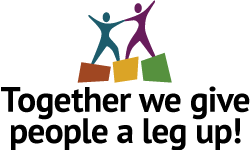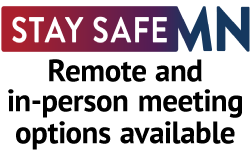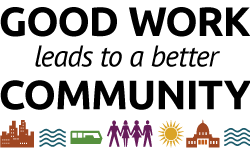
Government public assistance programs have onerous paperwork requirements and are often too rigid and too limited to adequately meet the unique needs of all the people in our community. At the same time, they provide a critical safety net for many people that would truly suffer without them. Equally important, these programs create space for nonprofits like Daily Work to focus their efforts and target interventions in meaningful ways that better support people in achieving their longer-term goals for financial sufficiency. At Daily Work, we do everything we can to maximize efficacy and minimize gaps for people in our community. Both public and private efforts are critical to long-term success.
Social Safety Nets Like SNAP
Hundreds of thousands of Minnesotans access government financial assistance programs such as Supplemental Nutrition Assistance Program (SNAP), Minnesota Family Investment Program (MFIP), which directly supports families with children, or emergency assistance funds. Unfortunately, in February 2023, the U.S. Department of Agriculture (USDA) ended the SNAP Covid-19 Emergency Allotment that had been since April 2020. This special measure was providing low-income households across the country with hundreds of extra dollars of grocery money per month(1). This drastic cut, combined with the sharp increase in grocery prices, is leading many Minnesotans to worry about keeping food on the table. The ending of SNAP emergency funds made big news, but it’s not the only program that helps Minnesotans make ends meet. Understanding a little more about our social safety net may help you or others find the most effective ways to get help.
Minnesota’s Social Services Get Many Things Right
Compared to the United States as a whole, Minnesota allocates significantly more state funding per person to public welfare programs (2). Although this measure doesn’t indicate how the money is spent, other evidence shows that Minnesotan social service programs are able to distribute funds somewhat effectively. More than 75 percent of Minnesotans who were eligible for SNAP funds in 2018, did receive them, raising tens of thousands of incomes above the poverty line. Better yet, two out of three families receiving MFIP are able to transition off the funding within three years or secure at least 30 hours of paid work (3). Nonprofits also help fill gaps in government assistance programs. For example, one of the first job seekers I worked with at Daily Work was struggling to pay his rent on time; he was a new arrival to the U.S. with health problems, making his job search much more difficult. We applied for emergency assistance from the county but he was denied because he did not yet have a job. We turned to another nonprofit, Zakat, Aid and Charity Assisting Humanity (ZACAH), that provides rental assistance to low-income individuals and families at risk of losing housing. Thanks to the collaboration between Daily Work and ZACAH, we were able to secure housing for this job seeker. Today, the job seeker is still housed and has employment that meets his needs!
Daily Work and Other Nonprofits Are Part of the Safety Net
As a Case Manager, I seek out resources for individuals whose health, immigration status, experiences, or circumstances are keeping them from meeting their basic needs. This might mean navigating complex renewal forms for state benefits or finding another nonprofit that provides specific support for rent, food, or transportation. Finding where and how to access benefits is a huge part of the work that I and other case managers do, but that’s not always the end of the process.
Forming partnerships with other nonprofits through repeated contact and advocacy makes a huge difference in the outcome of an application for aid. Ongoing collaboration through repeated applications builds trust and knowledge, expediting the process for our job seekers.
Daily Work’s primary goal is connecting job seekers to sustainable employment, but that’s more difficult if people are distracted about keeping food on the table or a roof over their head. Collaborating with government programs and other nonprofit organizations is key to Daily Work’s holistic services. Helping people to meet their basic needs paves the way for struggling individuals and families to find and keep work that enables them to thrive socially, emotionally, physically, and financially.
Sources:
- https://mn.gov/dhs/snap-changes/end-of-e-snap/
- https://www.urban.org/policy-centers/cross-center-initiatives/state-and-local-finance-initiative/projects/state-fiscal-briefs/minnesota
- https://www.cbpp.org/sites/default/files/atoms/files/snap_factsheet_minnesota.pdf
- https://www.gtcuw.org/wp-content/uploads/2022/01/2022-Benefits-Cliff-Survey.pdf











